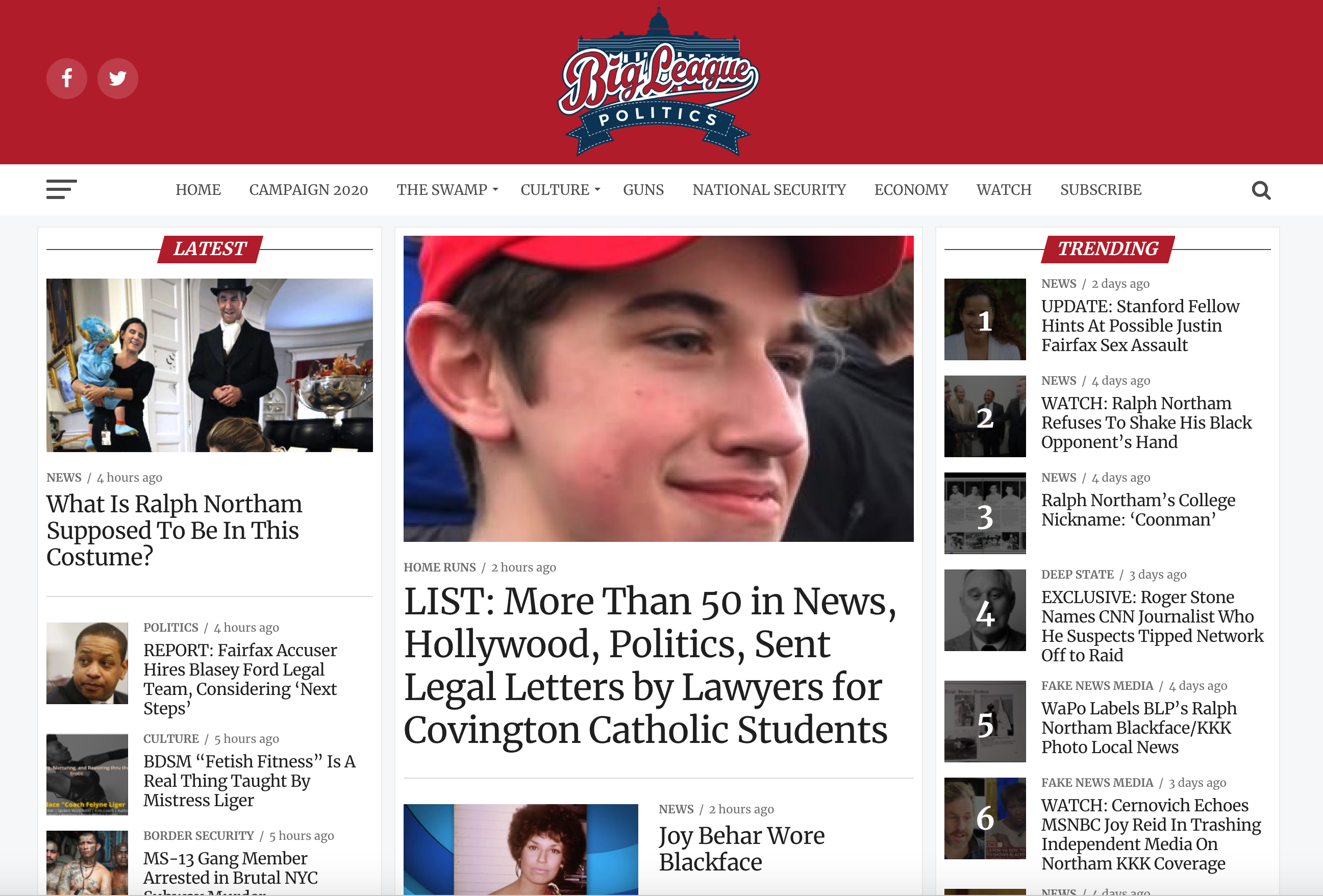
The homepage of Big League Politics on February 5, 2019. The hyper-partisan website was the first to publish unverified sexual assault allegations against Lt. Gov. of Virginia Justin Fairfax
The Washington Post’s decision to publish unverified sexual assault allegations is the most disturbing example of the flattening of the media landscape since the political press decided to spend more time on Hillary Clinton’s emails during the 2016 election cycle than on all of Donald Trump’s scandals combined.
In this new media world, our work isn’t ours alone. Our decisions aren’t ours alone to make. And even after we’ve made what we believe are the right, journalistically ethical choices, a non- or quasi-journalistic outfit can prompt us to undo our original decisions.
That’s what happened to The Washington Post.
What’s most discomforting is that there is no simple solution to the new dilemmas we seem to face daily.
More than a year ago, a woman approached The Washington Post with allegations that Justin Fairfax, now lieutenant governor of Virginia, had sexually assaulted her. As the Post reported on Feb. 4:
The woman approached The Post after Fairfax won election in November 2017 and before he was inaugurated in January 2018, saying she felt like she had an obligation to speak out. The woman and Fairfax first met in Boston at the 2004 Democratic national convention.
The Post did what good news outlets do: reported the allegations into the ground. At the end of that journey, it decided it did not have enough to go to press. It could verify neither version of the story, Fairfax’s or his accuser’s. The story amounted to an excruciating “he-said, she-said” that happened in a hotel room with no witnesses and no way to corroborate. The woman had not told anyone else about the allegations in the 13 years since the encounter—a verification tool that was useful in the case of Christine Blasey Ford against Brett Kavanaugh, for instance—which Fairfax and the accuser each admit at least began consensually. It’s the kind of story even first-year journalism students are taught to be wary of even if they believe the accuser, because belief isn’t enough; verification must be the standard.
Given the power and presence of the #MeToo movement, and the number of tips involving allegations against prominent public figures flowing into newsrooms around the country, there’s a good debate to be had about what kind of verification should serve as the minimal ethical journalistic standard to publish such allegations. And as it is for prosecutors who also face such questions when determining if they should go forward with charges, the nature of sexual assault provides no easy answers for our reporting dilemma.
Journalists don’t have the luxury of following the “believe all women” method or the #MeToo backlash that tries to make the standard so impossibly high that such allegations will be taken seriously only if they are on clear video or there is a confession.
The bigger dilemma is to not be prompted into reporting what we know doesn’t meet already-established standards.
In the case of the Clinton emails, the drip-drip-drip of the WikiLeaks dump, designed specifically to hurt Clinton, undercut the overall media’s ability to control what and when we chose to publish, even as we kept pretending we were in control because we vetted each cache of emails before producing our stories. We didn’t get that the drip-drip-drip nature of the leaks is what created the news—a nearly 24/7 political narrative that fed on itself—not any particular revelation from the emails.
In the case of the Post and the Fairfax story, the paper decided to publish a story about unverified sexual assault accusations after Fairfax’s chief of staff and communications director issued a statement about such allegations—only after the allegations had been published by the hyper-partisan Big League Politics website. The Post, and others, helped the site achieve its ends, just as we unwittingly helped Russia and WikiLeaks upend the 2016 election cycle.
The Post seemed to report the story only to refute part of Fairfax’s statement, which asserted that the Post had originally refused to publish because it had found “significant red flags and inconsistencies within the allegations.” Without any new revelations or verification of key facts, the Post’s decision to publish the allegations more than a year after it passed on them—even if only to refute Fairfax’s characterization—feels wrong. But a decision not to publish wouldn’t have felt quite right, either.
In today’s media environment, non- or quasi-journalistic outfits have a growing amount of power and influence to create news agendas and set narratives. They know how to use our well-established traditions against us. We need to have a greater sense of urgency if we are to effectively corral this burgeoning threat.


